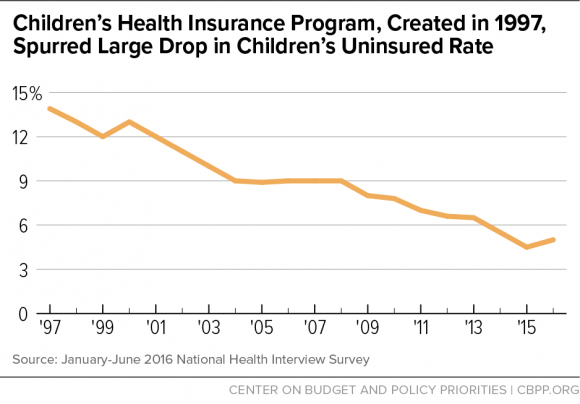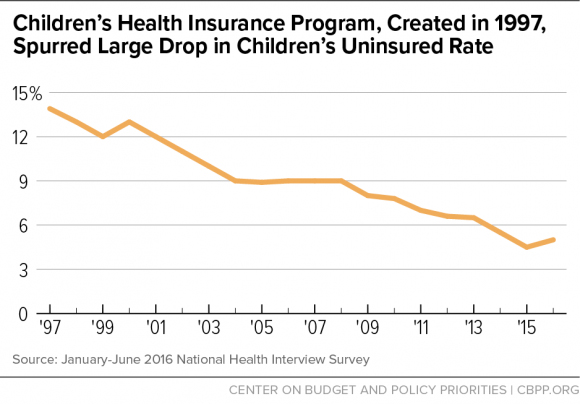
The Senate Finance Committee will hold a hearing Thursday on extending funding for the Children’s Health Insurance Program (CHIP), and for good reason: no additional CHIP funding is available for fiscal year 2018, which starts October 1. That places at severe risk a program that provides health coverage for nearly 9 million children.
States could keep their CHIP programs running for a short time after October 1 by using unspent funds from previous years, but those funds will soon run out, the Medicaid and CHIP Payment Access Commission (MACPAC) estimates. Three states — Arizona, Minnesota, and North Carolina — and Washington, D.C. will exhaust their federal CHIP allotments in December. Another 27 states will run out during the first quarter of calendar year 2018.
Without additional federal funds, states will have to dramatically raise their own spending to sustain their programs or sharply cut their programs. States with separate CHIP programs (rather than CHIP-funded Medicaid expansions for children) might impose enrollment caps or freezes, or shut their programs entirely. In addition, many states are required to notify families well in advance of any potential end of the state’s CHIP program. So states with separate CHIP programs that are projected to exhaust their federal CHIP funds this winter would likely need to send notices soon.
Fortunately, CHIP has enjoyed strong bipartisan support since President Clinton and Congress created it in 1997. Most recently, Congress overwhelmingly passed, and President Obama signed, a CHIP funding extension in 2015.
Any funding extension, however, should be for multiple years to allow states — some of which have biennial budgets — to plan their budgets. A bipartisan group of governors and the nonpartisan MACPAC have urged a five-year extension.
As in 2015, President Trump and Congress should enact a “clean” funding extension, consistent with the recommendations of governors and MACPAC. That means extending current policies that make it easier for children to enroll in and renew their coverage, while rejecting Administration proposals that would leave more children uninsured, like restricting eligibility. And policymakers should protect state budgets by retaining the Affordable Care Act’s (ACA) 23-percentage-point increase in the federal funding matching rate for CHIP (as compared to the pre-ACA matching rate), which is in effect through fiscal year 2019. Nearly all states responding to a recent National Academy for State Health Policy survey said that their budgets assume the matching rate will be in effect as scheduled for fiscal year 2018. Without it, states would face a roughly $3.5 billion cut in federal support for CHIP next federal fiscal year.
Children’s health coverage has hit an all-time high, with 95 percent of children covered in 2015, and the children’s uninsured rate fell by nearly two-thirds between 1997 and 2015 (see graph). That largely reflects the success of CHIP, Medicaid, and the ACA’s coverage expansions. To avoid jeopardizing this historic progress, the President and Congress should enact a clean, multi-year CHIP funding extension in September.

Join us in defending the truth before it’s too late
The future of independent journalism is uncertain, and the consequences of losing it are too grave to ignore. To ensure Truthout remains safe, strong, and free, we need to raise $24,000 by the end of today. Every dollar raised goes directly toward the costs of producing news you can trust.
Please give what you can — because by supporting us with a tax-deductible donation, you’re not just preserving a source of news, you’re helping to safeguard what’s left of our democracy.